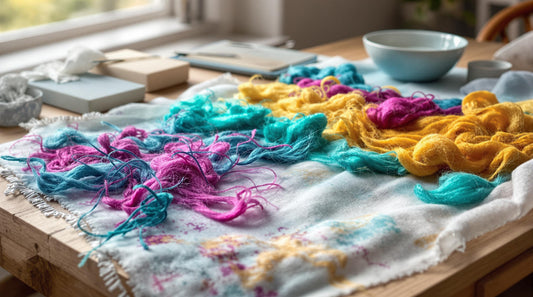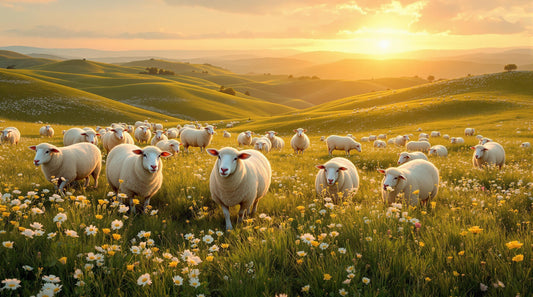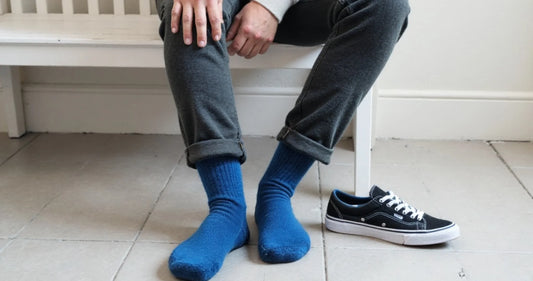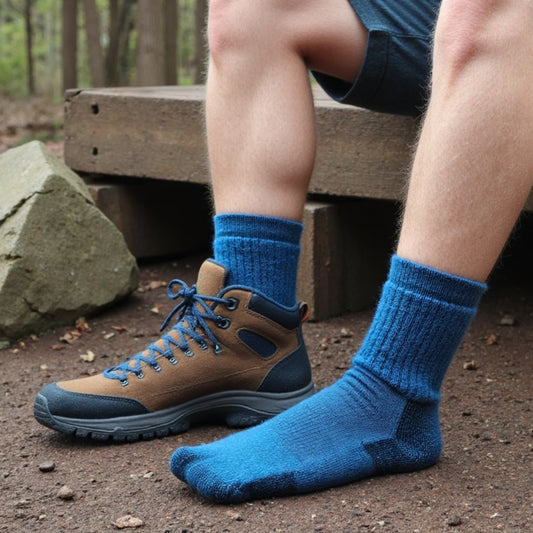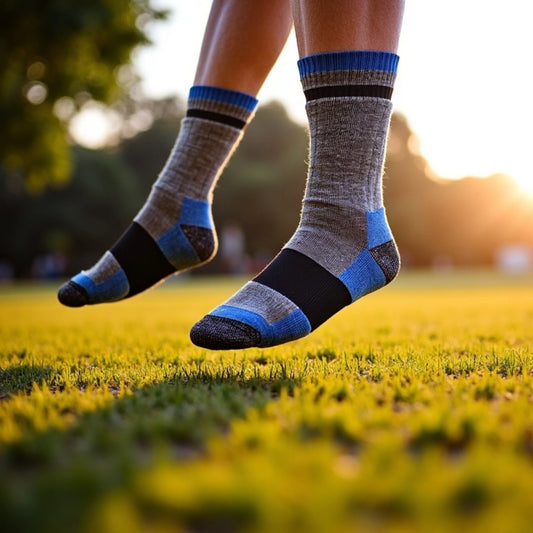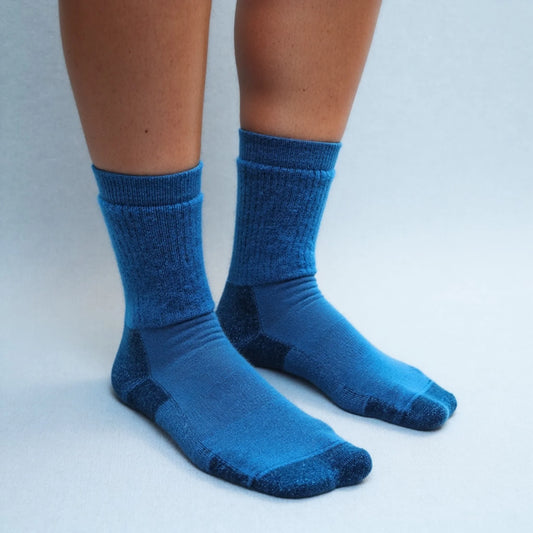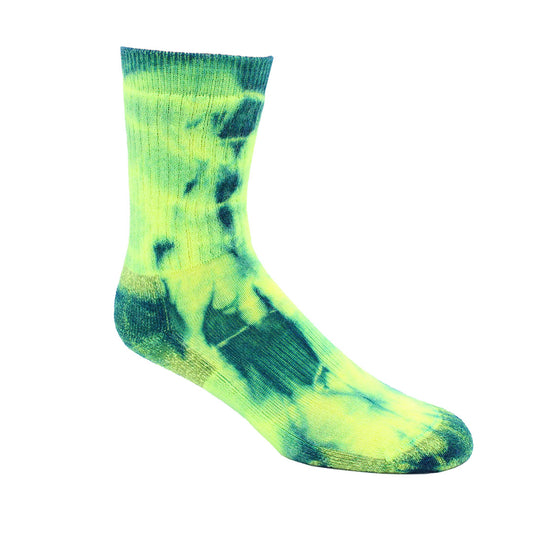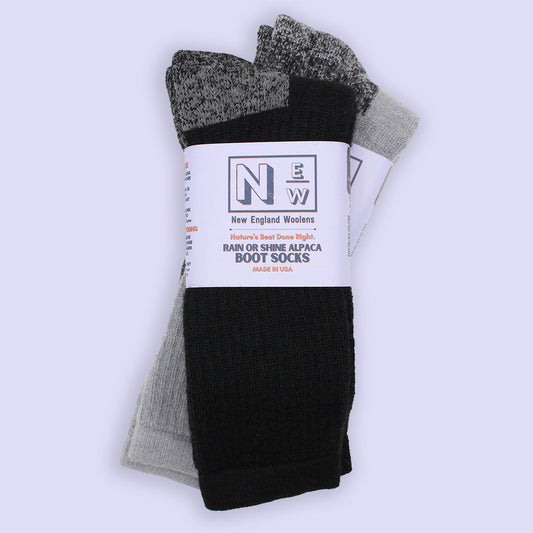Choosing between Merino and Alpaca wool? Here's what you need to know:
- Merino: Great for active wear, moisture-wicking, machine washable
- Alpaca: Warmer, softer, hypoallergenic, better for luxury items
Quick Comparison:
| Feature | Merino | Alpaca |
|---|---|---|
| Warmth | Warm | Up to 7x warmer |
| Moisture Wicking | Excellent | Good, dries faster |
| Allergens | Contains lanolin | Hypoallergenic |
| Durability | Good | Excellent, less pilling |
| Best Use | High-exertion activities | Extreme cold, luxury items |
| Price | $50-$200 | $60-$150 |
Choose Merino for outdoor sports and versatility. Pick Alpaca for extreme cold and sensitive skin. Both are natural, sustainable options that outperform synthetics.
Related video from YouTube
What Makes Merino Wool Special
Merino wool isn't your average wool. It's nature's answer to high-tech fabric. Here's why outdoor enthusiasts and comfort-seekers can't get enough of it:
How It Keeps You Comfortable
Think of Merino wool as your body's personal thermostat. Its fibers are so fine (16.5-19.5 microns) that they're thinner than human hair. This makes Merino incredibly soft and itch-free.
But here's the real magic: Merino adapts to your body temperature. When it's cold, it traps warm air close to your skin. When it's hot, it wicks moisture away, keeping you cool.
Take New England Woolens, for example. Their ECO-TRAIL MERINO WOOL HIKER SOCKS ($18) are built for all-day comfort, no matter the temperature.
Sweat Control and Strength
Merino isn't just soft - it's tough as nails. Check this out:
| Feature | What It Does |
|---|---|
| Moisture absorption | Soaks up 35% of its weight without feeling wet |
| Odor resistance | Fights bacteria, keeps smells away |
| Durability | Fibers can twist 20,000 times without breaking |
This combo makes Merino perfect for sweaty activities. You can wear it for days without washing - ideal for long hikes or travel.
Cost and Care
Yes, Merino often costs more. But its performance and longevity often make up for it. New England Woolens offers a 4-pack of Merino hiking socks for $68 - not bad for regular users.
And caring for Merino? It's a breeze:
- Toss it in the washing machine at 30-40°C
- It naturally sheds dirt and odor
- It even cleans itself in water
As ORTOVOX, a top outdoor gear company, puts it:
"A multi-functional and sustainable alternative to synthetics. A bit more expensive but longer-lasting and, above all, less likely to emit odor – so you need fewer changes of clothes on long tours."
In short: Merino wool isn't just clothing. It's a smart investment in comfort and performance.
What Makes Alpaca Wool Special
Alpaca wool isn't just another fuzzy fiber. It's nature's high-tech fabric with unique features that set it apart. Let's explore what makes alpaca wool so special.
Warmth and Skin-Friendly Features
Imagine wearing a cozy cloud. That's alpaca wool for you. It's super soft, often compared to cashmere but without the hefty price tag. And here's the kicker: it's hypoallergenic. No lanolin means no itchy skin or allergic reactions.
But the real magic? Thermal superpowers. Those hollow fibers trap heat like tiny thermoses, keeping you toasty warm.
Here's how it stacks up against merino wool:
| Feature | Alpaca Wool | Merino Wool |
|---|---|---|
| Warmth | Up to 5x warmer | Warm, but less so |
| Moisture Wicking | 85% better | Good, but not as effective |
| Allergens | Lanolin-free | Contains lanolin |
James Budd, owner of an alpaca wool company, puts it this way:
"Alpaca wool is stronger, softer, more eco-friendly, and offers 85% greater wicking capability than merino wool."
Strength and Price
Alpaca wool isn't just soft - it's tough. It resists pilling and wear better than other wools. Plus, it's lightweight, giving you warmth without the bulk.
And the price? Often more affordable than cashmere, with a similar luxury feel. For example, New England Woolens offers All Day Alpaca Crew Socks for $24. Quality alpaca products don't have to empty your wallet.
Caring for Alpaca Wool
Keeping your alpaca gear in top shape is a breeze. Hand wash in cool water with mild detergent. Don't wring or twist. Lay flat to dry and store in a cool, dry place.
The best part? Alpaca wool is naturally water-resistant and odor-resistant. This means less washing and more wearing - perfect for outdoor adventures or busy lifestyles.
So, ready to wrap yourself in nature's high-tech fabric?
Merino vs. Alpaca: Side by Side
Let's compare Merino and Alpaca wool to help you choose:
Feel and Warmth
Merino and Alpaca wool are both soft, but they're different:
| Feature | Merino Wool | Alpaca Wool |
|---|---|---|
| Softness | Very soft (16.5-19.5 microns) | Extremely soft (14.5-36 microns) |
| Warmth | Warm | Up to 5x warmer than Merino |
| Weight | Heavier for same warmth | Lighter for same warmth |
| Allergens | Contains lanolin | Hypoallergenic (no lanolin) |
Alpaca often feels smoother on the skin. It's great for sensitive skin. But high-quality Merino can be super soft too.
Air Flow and Sweat Control
Both wools handle sweat well, but differently:
| Aspect | Merino Wool | Alpaca Wool |
|---|---|---|
| Moisture Absorption | Up to 30% of its weight | About 11% of its weight |
| Wicking Ability | Excellent | 85% better than Merino |
| Drying Speed | Slower | Faster |
| Breathability | High | Very High |
Merino soaks up more sweat. That's great for intense workouts. But Alpaca wicks moisture away faster and dries quicker. It's perfect for changing weather.
James Budd, who owns an alpaca wool company, says:
"Alpaca wool wicks moisture 85% better than merino wool. It's awesome for outdoor lovers who need gear that dries fast."
Life Span and Earth-Friendly Rating
Both wools are natural and break down in nature. But they're different in how long they last and how they impact the environment:
| Factor | Merino Wool | Alpaca Wool |
|---|---|---|
| Durability | Good | Excellent (less pilling) |
| Tensile Strength | 30-40 | 50 |
| Environmental Impact | Lower | Very Low |
| Animal Welfare | Improving practices | Naturally low-impact animals |
Alpaca wool is stronger, so it lasts longer. Alpacas are also easier on the land than sheep. They have soft feet that don't damage the ground as much.
New England Woolens sells both types. Their ECO-TRAIL MERINO WOOL HIKER SOCKS cost $18. Their All Day Alpaca Crew Socks are $24. The Merino socks are comfy, while the Alpaca ones are tough and soft.
So, which should you pick? If you sweat a lot during intense activities, go for Merino. If you want something super warm but light, and you have allergies, choose Alpaca.
sbb-itb-b77f5dc
Which Wool Should You Pick?
Picking between Merino and Alpaca wool isn't just about staying warm. It's about finding the right fiber for your needs. Let's break it down:
Best Uses and Weather Match
| Activity/Climate | Best Wool | Why? |
|---|---|---|
| Intense workouts | Merino | Soaks up 30% of its weight in sweat |
| Cold weather | Alpaca | Up to 5x warmer than Merino (hollow fibers) |
| Sensitive skin | Alpaca | No lanolin, hypoallergenic |
| Layering | Merino | Thinner fibers (16.5-19.5 microns) |
| Humid climates | Alpaca | Dries faster, 85% better at wicking moisture |
New England Woolens has options for both. Their ECO-TRAIL MERINO WOOL HIKER SOCKS ($18) are great for long hikes. The All Day Alpaca Crew Socks ($24) shine in colder weather.
"Alpaca wool wicks moisture 85% better than merino wool. It's awesome for outdoor lovers who need gear that dries fast", says James Budd, an alpaca wool company owner.
Price and Care Needs
Your budget and willingness to care for wool items matter:
| Factor | Merino | Alpaca |
|---|---|---|
| Price | More affordable | Often pricier, luxury item |
| Durability | Good, can pill | Excellent, less pilling |
| Washing | Machine wash (30-40°C) | Hand wash recommended |
| Drying | Lay flat | Dries faster than Merino |
| Longevity | Replace more often | Lasts longer (stronger) |
On a budget but want quality? Go for Merino. A 4-pack of ECO-TRAIL MERINO HIKER SOCKS from New England Woolens costs $68 - good value for regular use.
Want to invest in long-lasting gear? Alpaca's your best bet. It's pricier upfront, but its durability and natural water-repellent qualities mean less washing and longer-lasting garments.
How to Care for Your Wool
Want your wool to last? Here's how to keep your Merino and Alpaca items in top shape.
Washing Guide
Merino and Alpaca wool need gentle care. Here's the lowdown:
| Wool Type | Washing Method | Water Temp | Detergent | Tips |
|---|---|---|---|---|
| Merino | Machine or hand | Cool (85°F max) | Mild, wool-specific | Gentle cycle, no bleach |
| Alpaca | Hand wash best | Cool to lukewarm | Gentle shampoo or mild soap | Don't wring or twist |
For Merino, New England Woolens says wash their ECO-TRAIL MERINO WOOL HIKER SOCKS ($18) after 3-4 heavy-use days. Their label says:
- Turn socks inside-out
- Use cool water and mild detergent
- Skip fabric softeners
- Air dry flat
For Alpaca, James Budd, an alpaca wool company owner, says:
"Soak alpaca in cool water with gentle detergent for 30 minutes. Rinse without twisting, then press out water between towels. This keeps the wool's natural properties and makes it last longer."
Both wools fight odors naturally. Often, just airing them out does the trick.
Storage Tips
Store your wool right to keep it in shape:
| Storage Aspect | Merino Wool | Alpaca Wool |
|---|---|---|
| Pre-storage cleaning | Must-do | Must-do |
| Best storage spot | Cool, dry place | Well-aired closet |
| Container | Breathable (cotton bags) | Breathable canvas bag with zip |
| Pest protection | Cedar or lavender | Cedar chips or lavender |
| Folding vs. Hanging | Fold knits, hang woven | Fold to avoid stretching |
Alpaca wool pro tip: Put new items in the fridge for 48+ hours before first wash. It can help the fibers last longer.
For long-term storage of either wool:
- Clean well before storing
- Use breathable containers to avoid yellowing and mold
- Add natural moth repellents like cedar or lavender
- Check items now and then for damp or bugs
Wrap-Up
Let's break down Merino vs Alpaca wool:
| Feature | Merino Wool | Alpaca Wool |
|---|---|---|
| Warmth | Warm | Up to 7x warmer than Merino |
| Moisture Absorption | Up to 30% of its weight | About 10-11% of its weight |
| Allergens | Contains lanolin | Hypoallergenic (no lanolin) |
| Durability | Good, prone to pilling | Excellent, less pilling |
| Price Range | $50 - $200 | $60 - $150 |
| Best Use | High-exertion activities | Extreme cold, luxury items |
Merino wool is a moisture-managing champ. It's perfect for sweaty outdoor adventures. Take New England Woolens' ECO-TRAIL MERINO WOOL HIKER SOCKS ($18). They'll keep your feet comfy on long hikes.
Alpaca wool? It's all about warmth and toughness. It's your go-to for freezing temps and fancy feels. Check out New England Woolens' All Day Alpaca Crew Socks ($24). They're the epitome of alpaca awesomeness.
So, how do you pick? Here's the deal:
1. Sweat Factor
Are you gonna be huffing and puffing? Merino's your buddy. It wicks moisture like a boss.
2. Temperature
Freezing your butt off? Alpaca's got your back. It's a toasty 7 times warmer than Merino.
3. Sensitive Skin
Got itchy issues with wool? Alpaca's hypoallergenic. No sneeze fest here.
4. Cash
Merino's got options for every wallet. Alpaca's pricier, but it'll outlast your ex's grudge.
5. Laundry Day
Merino? Toss it in the machine. Alpaca? Better roll up those sleeves for some hand-washing action.
Here's the kicker: both wools rock. Your choice? It's all about YOU.
"The Merino vs alpaca showdown? It's a personal thing. You do you." - Some Smart Person
So, whether you're Team Merino or Team Alpaca, you're getting top-notch, nature-made goodness. It'll have your back (or feet, or whatever) in all sorts of wild weather.
FAQs
How does alpaca wool compare to Merino wool?
Alpaca and Merino wool are like two siblings - they're related, but they've got their own unique personalities. Here's the lowdown:
Alpaca wool is the soft, cuddly type. It's SUPER warm (up to 7 times warmer than Merino!) and feels like silk against your skin. But it's not the tough guy in the family. It can stretch out and isn't great for rough-and-tumble activities.
Merino wool is the sporty one. It's still soft, but it can take a beating. It's perfect for outdoor adventures because it wicks moisture like a champ and keeps its shape.
James Budd, who runs an alpaca wool company, says:
"Alpaca wool wicks moisture 85% better than merino wool. It's awesome for outdoor lovers who need gear that dries fast."
But here's the thing: Merino is still the go-to for outdoor gear. Just look at New England Woolens' ECO-TRAIL MERINO WOOL HIKER SOCKS ($18). They're tough enough for hiking but still comfy.
So, what's the bottom line? Alpaca for luxury, Merino for performance.
Which is better, alpaca or merino wool?
It's not about which is "better" - it's about which is right for YOU. Here's a quick guide:
Go for alpaca if:
- You want the softest, warmest non-active wear
- You're dealing with Arctic-level cold
- Your skin is super sensitive
- You're okay splurging on luxury
Choose Merino if:
- You're an outdoor sports enthusiast
- You need something versatile for all seasons
- You want quality without breaking the bank
Outdoor Life puts it this way:
"Alpaca isn't a great fabric for performance outdoor gear; whereas 100% Merino wool garments (like our Inversion base layers) are plenty durable for winter outdoor sports."
But don't count alpaca out! For cozy, non-active wear, it's hard to beat. New England Woolens' All Day Alpaca Crew Socks ($24) are a perfect example of alpaca's luxurious feel.


